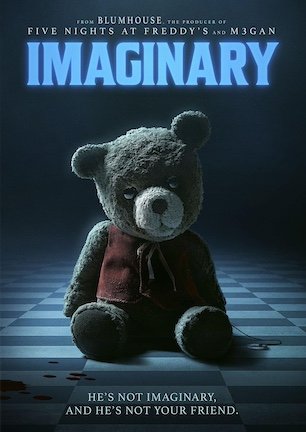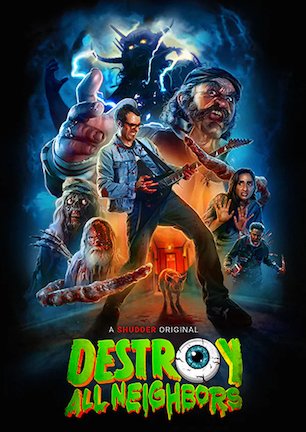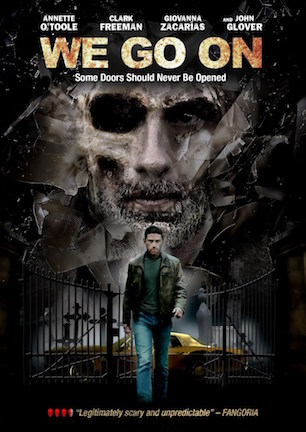Studio: Momentum Pictures
Director: Simon Rumley
Writer: Ben Ketai, Marc Haimes, Tony Giglio
Producer: Rob DeFranco, Peter Facinelli, Eric Gores, Frank Mancuso Jr.
Stars: Mike Doyle, Erin Cummings, Sean Patrick Flannery, Dodge Prince, Devin Bonnee, Cassie Shea Watson, Heather L. Tyler, Allyn Carrell
Review Score:
Summary:
An executed man exacts revenge from beyond the grave after cursing everyone involved in his conviction.
Review:
The following events actually occurred in Amarillo, Texas. On Halloween in 1981, someone broke into the St. Francis Convent, raped, strangled, and stabbed Sister Tadea Benz to death in her bed. Justice was seemingly served one year later when Johnny Frank Garrett, two months away from his 18th birthday at the time of the crimes, was sentenced to death for murdering Benz.
Another ten years passed and punishment at last arrived by lethal injection. Before the needle broke skin, Johnny Frank Garrett left behind a curse letter wishing vengeance on everyone involved in his conviction. Still professing his innocence, Garrett’s last words were spent telling the world they could “kiss (his) ever-lovin’ ass.”
With “Johnny Frank Garrett’s Last Word,” director Simon Rumley takes that true crime tale and asks, what if this curse actually came to pass? The result is a “Nightmare on Elm Street”-style supernatural revenge thriller with a real-life twist.
Shadows of doubt have long dogged assertions of Garrett’s guilt. Evidence of possible innocence, or at least unfair prosecutorial railroading, include claims involving unsigned confessions, odd alibis, supposed mental retardation, and suspicion suggesting a man connected to a similar crime could be the real killer.
Digging deeper through usual amateur channels yields limited results. As of this writing, attorney Jesse Quackenbush’s 2008 documentary “The Last Word,” which influenced this fictionalized follow-up, is unavailable via Netflix, Amazon, or even YouTube. Johnny Frank Garrett doesn’t even have a dedicated Wikipedia page documenting his case or the crime. In other words, Garrett appears to not be a popularly discussed topic and independently corroborating the circumstances surrounding his conviction is not an easy task.
Encapsulating the movie in a more recognizable analogy, a crude comparison might be to say, imagine if Steven Avery from “Making a Murderer” were executed. Now imagine a fictional film in which Avery returns as a paranormal force out for revenge against those who wronged him. That’s essentially the idea inspiring “Johnny Frank Garrett’s Last Word.”
Refashioning a terrible tragedy into midnight movie entertainment might seem like a tastelessly taboo topic for a horror film to tackle. But consider that three of Johnny Frank Garrett’s surviving family members appeared onstage after the SXSW 2016 premiere with tears in their eyes and lumps in their throats while thanking director Simon Rumley for keeping their executed relative’s memory alive. Their enthusiastic support seemingly absolves the project of any unpardonable sin.
The story starts on Wednesday, September 1st of 1982. It’s deliberation day for Johnny Frank Garrett’s jury and future family man Adam Redman holds the only opinion of “not guilty.” Instead of treating Adam like Henry Fonda or Jack Lemmon and talking it through, the restless rest of the room convinces him to get on with it and Adam caves to the peer pressure.
Ten years later, jurors, witnesses, attorneys, and assorted willing and unwilling conspirators in Garrett’s conviction start turning up dead. Some seem possessed. Others are driven to suicide. Once he is clued into the pattern, Adam isn’t sure if he sees a supernatural connection or if he is simply losing his mind. But after his young son Sam takes ill with strange visions of his own, Adam becomes convinced that his family is fated for similar doom if he can’t solve the murderous mystery.
The primary problem with turning Johnny Frank Garrett into Horace Pinker is that “Johnny Frank Garrett’s Last Word” doesn’t present him as a powerful personality. The movie opens with Garrett’s conviction and execution, leaving little opportunity to choose an informed side regarding guilt or innocence, much less come to understand the man in any meaningful way.
Stemming from that, if you actually decide to buy into Garrett’s innocence and the authenticity of his curse, then it is difficult to extend sympathy to someone so hateful that he would kill women and children from beyond the grave just because they are peripherally related to someone involved in his verdict. It’s one thing to seek vengeance on a corrupt prosecutor. It’s another to go after the son of someone misled by nothing more conspiratorial than understandable uncertainty.
The notion of a curse is poppycock anyway. Many names are unchanged for the fiction, but facts are fudged to fit the narrative so the timeline can be contained to 1992. For example, juror Novella Sumner dies after a seeming state of possession inspires a fall down the stairs not long after Garrett’s death. In reality, Sumner did indeed die following a fall, but it was ten years after the execution at age 81. Father Time had more of a hand in her fate than Johnny Frank Garrett did.
A more relevant matter for the movie is uneven acting that isn’t always tuned to a realistic frequency. Mike Doyle of “The Invitation” (review score) takes things seriously as Adam and does an effective job. He just ends up fighting against overdramatic theatrics as much as he does Johnny Frank Garrett’s ghost. Sean Patrick Flannery in particular seems to have fun taking his sneering antagonist role to extremes, though it comes at the expense of being just one mustache twirl short of cartoon villainy.
The biggest boon for “Johnny Frank Garrett’s Last Word” is also its greatest drawback. The real world connection adds an edge of fascination to the fiction that is intriguing while also being an unusual way to generate interest in a little-known slice of courtroom controversy. Take away that tether and it is hard to imagine giving “Johnny Frank Garrett’s Last Word” a second thought as something more than routine revenge horror.
On the other hand, throwing out that true crime tie to dismiss the movie as inconsequential is unfair. The truth of the matter is that fact is integral to the film’s DNA, and is the ingredient elevating it above the usual supernatural slasher fare. “Johnny Frank Garrett’s Last Word” is often overwrought, with occasional chuckle-worthy cheesiness, but there is enough sincerity on display to admire the movie for taking an unorthodox approach toward mixing horror with history.
Review Score: 65







If you want to see impossible amounts of blood explode crimson colors like the world’s worst version of a gender reveal, well, “Abigail” at least has that.